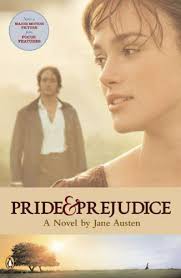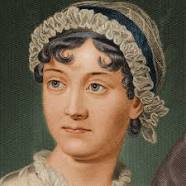Pride and Prejudice Page #21
Pride and Prejudice is a romantic novel by Jane Austen, first published in 1813. The story charts the emotional development of the protagonist, Elizabeth Bennet, who learns the error of making hasty judgments and comes to appreciate the difference between the superficial and the essential. The comedy of the writing lies in the depiction of manners, education, marriage, and money during the British Regency period.
“He is a sweet-tempered, amiable, charming man. He cannot know what Mr. Darcy is.” “Probably not; but Mr. Darcy can please where he chooses. He does not want abilities. He can be a conversible companion if he thinks it worth his while. Among those who are at all his equals in consequence, he is a very different man from what he is to the less prosperous. His pride never deserts him; but with the rich he is liberal-minded, just, sincere, rational, honourable, and perhaps agreeable--allowing something for fortune and figure.” The whist party soon afterwards breaking up, the players gathered round the other table and Mr. Collins took his station between his cousin Elizabeth and Mrs. Phillips. The usual inquiries as to his success were made by the latter. It had not been very great; he had lost every point; but when Mrs. Phillips began to express her concern thereupon, he assured her with much earnest gravity that it was not of the least importance, that he considered the money as a mere trifle, and begged that she would not make herself uneasy. “I know very well, madam,” said he, “that when persons sit down to a card-table, they must take their chances of these things, and happily I am not in such circumstances as to make five shillings any object. There are undoubtedly many who could not say the same, but thanks to Lady Catherine de Bourgh, I am removed far beyond the necessity of regarding little matters.” Mr. Wickham's attention was caught; and after observing Mr. Collins for a few moments, he asked Elizabeth in a low voice whether her relation was very intimately acquainted with the family of de Bourgh. “Lady Catherine de Bourgh,” she replied, “has very lately given him a living. I hardly know how Mr. Collins was first introduced to her notice, but he certainly has not known her long.” “You know of course that Lady Catherine de Bourgh and Lady Anne Darcy were sisters; consequently that she is aunt to the present Mr. Darcy.” “No, indeed, I did not. I knew nothing at all of Lady Catherine's connections. I never heard of her existence till the day before yesterday.” “Her daughter, Miss de Bourgh, will have a very large fortune, and it is believed that she and her cousin will unite the two estates.” This information made Elizabeth smile, as she thought of poor Miss Bingley. Vain indeed must be all her attentions, vain and useless her affection for his sister and her praise of himself, if he were already self-destined for another. “Mr. Collins,” said she, “speaks highly both of Lady Catherine and her daughter; but from some particulars that he has related of her ladyship, I suspect his gratitude misleads him, and that in spite of her being his patroness, she is an arrogant, conceited woman.” “I believe her to be both in a great degree,” replied Wickham; “I have not seen her for many years, but I very well remember that I never liked her, and that her manners were dictatorial and insolent. She has the reputation of being remarkably sensible and clever; but I rather believe she derives part of her abilities from her rank and fortune, part from her authoritative manner, and the rest from the pride for her nephew, who chooses that everyone connected with him should have an understanding of the first class.” Elizabeth allowed that he had given a very rational account of it, and they continued talking together, with mutual satisfaction till supper put an end to cards, and gave the rest of the ladies their share of Mr. Wickham's attentions. There could be no conversation in the noise of Mrs. Phillips's supper party, but his manners recommended him to everybody. Whatever he said, was said well; and whatever he did, done gracefully. Elizabeth went away with her head full of him. She could think of nothing but of Mr. Wickham, and of what he had told her, all the way home; but there was not time for her even to mention his name as they went, for neither Lydia nor Mr. Collins were once silent. Lydia talked incessantly of lottery tickets, of the fish she had lost and the fish she had won; and Mr. Collins in describing the civility of Mr. and Mrs. Phillips, protesting that he did not in the least regard his losses at whist, enumerating all the dishes at supper, and repeatedly fearing that he crowded his cousins, had more to say than he could well manage before the carriage stopped at Longbourn House. Chapter 17 Elizabeth related to Jane the next day what had passed between Mr. Wickham and herself. Jane listened with astonishment and concern; she knew not how to believe that Mr. Darcy could be so unworthy of Mr. Bingley's regard; and yet, it was not in her nature to question the veracity of a young man of such amiable appearance as Wickham. The possibility of his having endured such unkindness, was enough to interest all her tender feelings; and nothing remained therefore to be done, but to think well of them both, to defend the conduct of each, and throw into the account of accident or mistake whatever could not be otherwise explained. “They have both,” said she, “been deceived, I dare say, in some way or other, of which we can form no idea. Interested people have perhaps misrepresented each to the other. It is, in short, impossible for us to conjecture the causes or circumstances which may have alienated them, without actual blame on either side.” “Very true, indeed; and now, my dear Jane, what have you got to say on behalf of the interested people who have probably been concerned in the business? Do clear them too, or we shall be obliged to think ill of somebody.” “Laugh as much as you choose, but you will not laugh me out of my opinion. My dearest Lizzy, do but consider in what a disgraceful light it places Mr. Darcy, to be treating his father's favourite in such a manner, one whom his father had promised to provide for. It is impossible. No man of common humanity, no man who had any value for his character, could be capable of it. Can his most intimate friends be so excessively deceived in him? Oh! no.” “I can much more easily believe Mr. Bingley's being imposed on, than that Mr. Wickham should invent such a history of himself as he gave me last night; names, facts, everything mentioned without ceremony. If it be not so, let Mr. Darcy contradict it. Besides, there was truth in his looks.” “It is difficult indeed--it is distressing. One does not know what to think.” “I beg your pardon; one knows exactly what to think.” But Jane could think with certainty on only one point--that Mr. Bingley, if he had been imposed on, would have much to suffer when the affair became public. The two young ladies were summoned from the shrubbery, where this conversation passed, by the arrival of the very persons of whom they had been speaking; Mr. Bingley and his sisters came to give their personal invitation for the long-expected ball at Netherfield, which was fixed for the following Tuesday. The two ladies were delighted to see their dear friend again, called it an age since they had met, and repeatedly asked what she had been doing with herself since their separation. To the rest of the family they paid little attention; avoiding Mrs. Bennet as much as possible, saying not much to Elizabeth, and nothing at all to the others. They were soon gone again, rising from their seats with an activity which took their brother by surprise, and hurrying off as if eager to escape from Mrs. Bennet's civilities.
Translation
Translate and read this book in other languages:
Select another language:
- - Select -
- 简体中文 (Chinese - Simplified)
- 繁體中文 (Chinese - Traditional)
- Español (Spanish)
- Esperanto (Esperanto)
- 日本語 (Japanese)
- Português (Portuguese)
- Deutsch (German)
- العربية (Arabic)
- Français (French)
- Русский (Russian)
- ಕನ್ನಡ (Kannada)
- 한국어 (Korean)
- עברית (Hebrew)
- Gaeilge (Irish)
- Українська (Ukrainian)
- اردو (Urdu)
- Magyar (Hungarian)
- मानक हिन्दी (Hindi)
- Indonesia (Indonesian)
- Italiano (Italian)
- தமிழ் (Tamil)
- Türkçe (Turkish)
- తెలుగు (Telugu)
- ภาษาไทย (Thai)
- Tiếng Việt (Vietnamese)
- Čeština (Czech)
- Polski (Polish)
- Bahasa Indonesia (Indonesian)
- Românește (Romanian)
- Nederlands (Dutch)
- Ελληνικά (Greek)
- Latinum (Latin)
- Svenska (Swedish)
- Dansk (Danish)
- Suomi (Finnish)
- فارسی (Persian)
- ייִדיש (Yiddish)
- հայերեն (Armenian)
- Norsk (Norwegian)
- English (English)
Citation
Use the citation below to add this book to your bibliography:
Style:MLAChicagoAPA
"Pride and Prejudice Books." Literature.com. STANDS4 LLC, 2025. Web. 11 Jan. 2025. <https://www.literature.com/book/pride_and_prejudice_9>.




Discuss this Pride and Prejudice book with the community:
Report Comment
We're doing our best to make sure our content is useful, accurate and safe.
If by any chance you spot an inappropriate comment while navigating through our website please use this form to let us know, and we'll take care of it shortly.
Attachment
You need to be logged in to favorite.
Log In